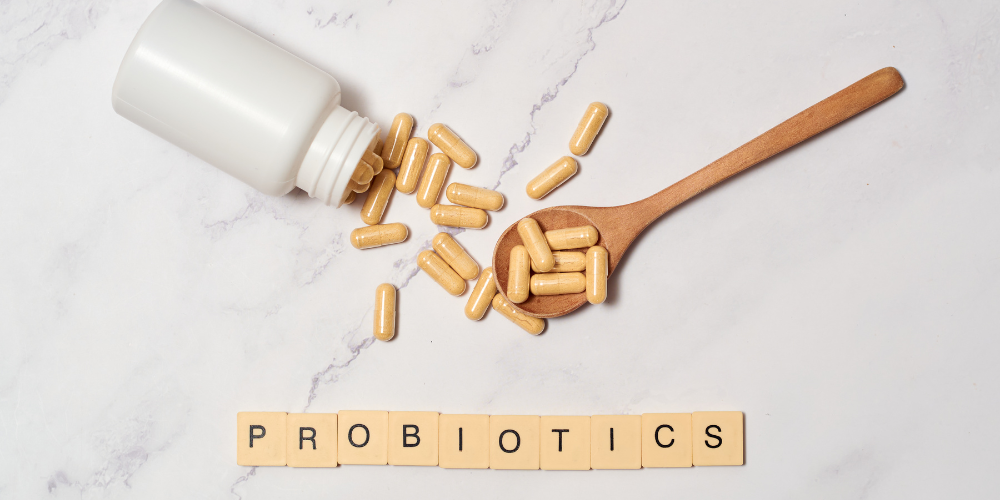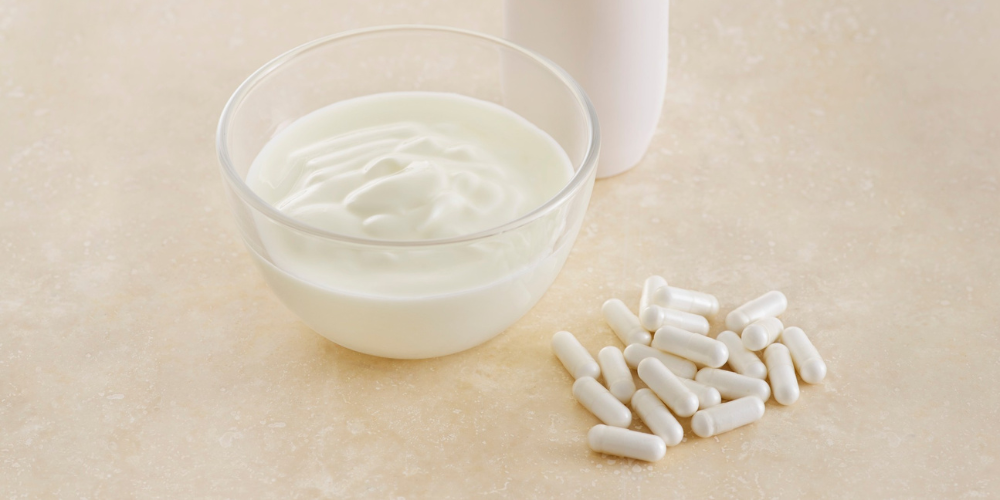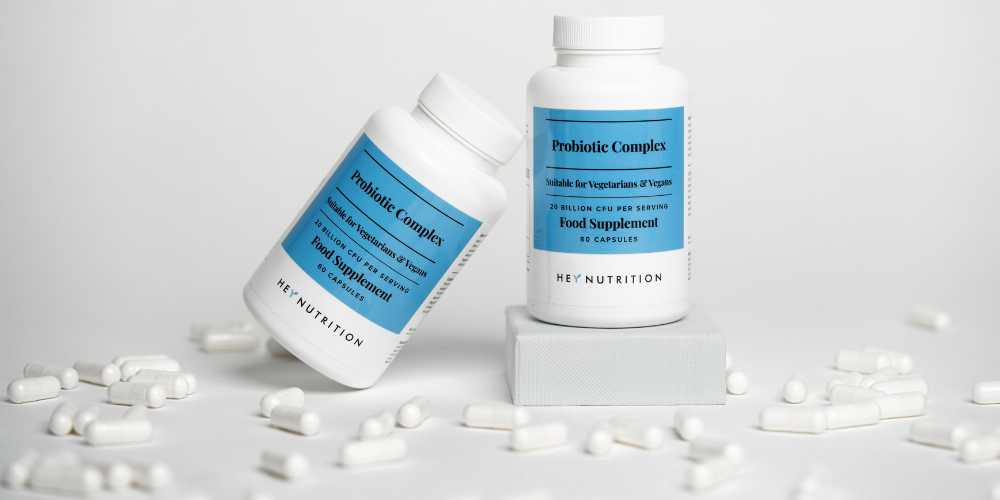
2023 is the Year of Probiotics… Here’s Why
New Year, New You?
When working on the new you and transforming your health, you should start with your gut health. Here’s why: your gut health is directly linked to other parts of your health.
While your diet and lifestyle habits can play a role in your gut health, sometimes we just need a little help. That’s where probiotics come in.
We’re claiming that 2023 is the year of probiotics!
Keep reading to get to know your gut and why you should consider implementing probiotics into your daily supplement regimen.

Get to Know Your Gut
First things first, let’s get to know all about your gut and the bacteria that live there. Yes—bacteria. Don’t worry, it’s a good kind of bacteria!
Bacteria, viruses, fungi, and other microscopic living things that exist inside your intestines and on your skin are referred to as microorganisms or microbes. Fun fact: You have more bacterial cells in your body than human cells—You have roughly 40 trillion bacterial cells in your body versus only 30 trillion human cells.[1,2]
The microbes found in your intestines are referred to as the gut microbiome or gut flora. Everyone has nearly 200 different species of microbes in their digestive tract.[3] While some are harmful to your health, there are many that are beneficial and necessary for your health.[4]
Your gut flora performs many functions that impact your health, like making vitamins, including vitamin K and a few B vitamins.
It also helps your gut wall by turning fibres into short-chain fats that feed it. These fats also can help your metabolic functions and stimulate your immune system.[5,6,7,8,9]
Unfortunately, your gut flora is extremely sensitive and, when unbalanced, can lead to a handful of health issues.[10,11] That’s where probiotics come in.

What are Probiotics?
Probiotics are live microorganisms that can help balance your gut and help get your gut flora to get back on track.[12] Many of these microorganisms in probiotics are about the same that naturally live in your body.
You can find probiotics in fermented foods like yoghurt, or dietary supplements.
Types of Bacteria Found in Probiotics
There are a lot of different types of bacteria strains. However, there are two in particular that are common regarding probiotic supplements: Lactobacillus and Bifidobacterium. Additionally, some probiotics contain yeasts such as Saccharomyces boulardii.

How to Find the Best Probiotics
It’s easy to get overwhelmed when searching for the right supplements for you—there are so many options out there. Here are a few things to keep in mind when shopping for probiotics:
High Count of CFUs (Colony Forming Units)
The number of CFUs can play a role in how effective the probiotic is. CFU refers to the amount of live and active microorganisms found in each serving. The microorganisms will begin to colonise the good bacteria in your digestive tract.
You want a probiotic that has a dose that contains organisms in the billions. To achieve the optimum digestive and immune health benefits that probiotics can provide, make sure you have the correct amount of a proven strain.
Pure Ingredients
Supplements that contain ingredients that have been scientifically studied and proven to work are ideal. Look for supplements that have pure, simple ingredients. It ensures you are getting all the benefits that probiotics have to offer.
Naturally Sourced Strains
Diversity is your friend. Multi-strain mixtures benefit you and your health since there is a broader range of effects and more mechanisms of action.[23]
Find a probiotic with naturally sourced strains, that are vegan-friendly, non-GMO, and free of pesticides, artificial flavours, and dairy.
Delayed-Release
Delayed-release capsules make sure that the probiotic is realised in your gut where it will have the greatest effect, rather than breaking down in your stomach acid.
Contains Prebiotics
While prebiotics isn’t always in probiotics, they are definitely a great feature to consider. Prebiotics can help digestion and overall health by increasing the effectiveness of probiotics by fueling good bacteria.
Made in the UK
Regulations on probiotics vary around the world. To be safe, we recommend only buying probiotics from UK-based brands that you trust.

Our Pick
Our very own HeyNutrition Probiotic Complex checks all the boxes.
Our Probiotic Complex is crafted with a unique formula that helps to establish optimal health where it matters most: in the gut. It effectively works on supporting immune health and your digestive enzymes, so you can establish body harmony and feel great every day.
We believe in quality over quantity, which is why our Probiotic Complex contains only the highest-quality bacteria strains in professionally recommended doses. Each serving contains 20 billion CFUs of 7 probiotic strains that are clinically proven to work. Plus, we included Inulin—a prebiotic—to increase effectiveness.
Delayed-release vegan/vegetarian capsules help ensure the supplement is protected from harsh stomach acid and released in the intestines for maximum nutrient absorption.
Ready to try it out for yourself? Click here!
Resources:
- Qin, J., Li, R., Raes, J., Arumugam, M., Burgdorf, K. S., Manichanh, C., Nielsen, T., Pons, N., Levenez, F., Yamada, T., Mende, D. R., Li, J., Xu, J., Li, S., Li, D., Cao, J., Wang, B., Liang, H., Zheng, H., Xie, Y., … Wang, J. (2010). A human gut microbial gene catalogue established by metagenomic sequencing. Nature, 464(7285), 59–65. https://doi.org/10.1038/nature08821
- Sender, R., Fuchs, S., & Milo, R. (2016). Revised Estimates for the Number of Human and Bacteria Cells in the Body. PLoS biology, 14(8), e1002533. https://doi.org/10.1371/journal.pbio.1002533
- Hills, R. D., Jr, Pontefract, B. A., Mishcon, H. R., Black, C. A., Sutton, S. C., & Theberge, C. R. (2019). Gut Microbiome: Profound Implications for Diet and Disease. Nutrients, 11(7), 1613. https://doi.org/10.3390/nu11071613
- Valdes, A. M., Walter, J., Segal, E., & Spector, T. D. (2018). Role of the gut microbiota in nutrition and health. BMJ (Clinical research ed.), 361, k2179. https://doi.org/10.1136/bmj.k2179
- Rowland, I., Gibson, G., Heinken, A. et al. Gut microbiota functions: metabolism of nutrients and other food components. Eur J Nutr 57, 1–24 (2018). https://doi.org/10.1007/s00394-017-1445-8
- Natarajan, N., & Pluznick, J. L. (2014). From microbe to man: the role of microbial short chain fatty acid metabolites in host cell biology. American journal of physiology. Cell physiology, 307(11), C979–C985. https://doi.org/10.1152/ajpcell.00228.2014
- Kim, C. H., Park, J., & Kim, M. (2014). Gut microbiota-derived short-chain Fatty acids, T cells, and inflammation. Immune network, 14(6), 277–288. https://doi.org/10.4110/in.2014.14.6.277
- Lei, Y. M., Nair, L., & Alegre, M. L. (2015). The interplay between the intestinal microbiota and the immune system. Clinics and research in hepatology and gastroenterology, 39(1), 9–19. https://doi.org/10.1016/j.clinre.2014.10.008
- Caricilli, A. M., Castoldi, A., & Câmara, N. O. (2014). Intestinal barrier: A gentlemen's agreement between microbiota and immunity. World journal of gastrointestinal pathophysiology, 5(1), 18–32. https://doi.org/10.4291/wjgp.v5.i1.18
- Bull, M. J., & Plummer, N. T. (2014). Part 1: The Human Gut Microbiome in Health and Disease. Integrative medicine (Encinitas, Calif.), 13(6), 17–22.
- Zhang, Y.-J., Li, S., Gan, R.-Y., Zhou, T., Xu, D.-P., & Li, H.-B. (2015). Impacts of Gut Bacteria on Human Health and Diseases. International Journal of Molecular Sciences, 16(12), 7493–7519. https://doi.org/10.3390/ijms16047493
- Shah, B. R., Li, B., Al Sabbah, H., Xu, W., & Mráz, J. (2020). Effects of prebiotic dietary fibers and probiotics on human health: With special focus on recent advancement in their encapsulated formulations. Trends in Food Science & Technology, 102, 178–192. https://doi.org/10.1016/j.tifs.2020.06.010
- U.S. Department of Health and Human Services. (n.d.). Probiotics: What you need to know. National Center for Complementary and Integrative Health. Retrieved November 11, 2022, from https://www.nccih.nih.gov/health/probiotics-what-you-need-to-know
- Kim, S. K., Guevarra, R. B., Kim, Y. T., Kwon, J., Kim, H., Cho, J. H., Kim, H. B., & Lee, J. H. (2019). Role of Probiotics in Human Gut Microbiome-Associated Diseases. Journal of microbiology and biotechnology, 29(9), 1335–1340. https://doi.org/10.4014/jmb.1906.06064
- Wieërs, G., Belkhir, L., Enaud, R., Leclercq, S., Philippart de Foy, J. M., Dequenne, I., de Timary, P., & Cani, P. D. (2020). How Probiotics Affect the Microbiota. Frontiers in cellular and infection microbiology, 9, 454. https://doi.org/10.3389/fcimb.2019.00454
- Wilkins, T., & Sequoia, J. (2017). Probiotics for Gastrointestinal Conditions: A Summary of the Evidence. American family physician, 96(3), 170–178.
- Zhang, C., Derrien, M., Levenez, F., Brazeilles, R., Ballal, S. A., Kim, J., Degivry, M. C., Quéré, G., Garault, P., van Hylckama Vlieg, J. E., Garrett, W. S., Doré, J., & Veiga, P. (2016). Ecological robustness of the gut microbiota in response to ingestion of transient food-borne microbes. The ISME journal, 10(9), 2235–2245. https://doi.org/10.1038/ismej.2016.13
- Singh, V. P., Sharma, J., Babu, S., Rizwanulla, & Singla, A. (2013). Role of probiotics in health and disease: a review. JPMA. The Journal of the Pakistan Medical Association, 63(2), 253–257.
- Mörkl, Sabrina et al. “Probiotics and the Microbiota-Gut-Brain Axis: Focus on Psychiatry.” Current nutrition reports vol. 9,3 (2020): 171-182. doi:10.1007/s13668-020-00313-5
- Luna, R. A., & Foster, J. A. (2015). Gut Brain Axis: Diet microbiota interactions and implications for modulation of anxiety and Depression. Current Opinion in Biotechnology, 32, 35–41. https://doi.org/10.1016/j.copbio.2014.10.007
- Lescheid, D. W. (2014). Probiotics as regulators of inflammation: A Review. Functional Foods in Health and Disease, 4(7), 299. https://doi.org/10.31989/ffhd.v4i7.2
- Lolou, V., & Panayiotidis, M. I. (2019). Functional Role of Probiotics and Prebiotics on Skin Health and Disease. Fermentation, 5(2), 41. https://doi.org/10.3390/fermentation5020041
- Chang, Hung-Yang, et al. “Multiple Strains Probiotics Appear to Be the Most Effective Probiotics in the Prevention of Necrotizing Enterocolitis and Mortality: An Updated Meta-Analysis.” PLOS ONE, vol. 12, no. 2, 2017, doi:10.1371/journal.pone.0171579.
- Lim, S., Moon, J. H., Shin, C. M., Jeong, D., & Kim, B. (2020). Effect of Lactobacillus sakei, a Probiotic Derived from Kimchi, on Body Fat in Koreans with Obesity: A Randomized Controlled Study. Endocrinology and metabolism (Seoul, Korea), 35(2), 425–434. https://doi.org/10.3803/EnM.2020.35.2.425
- Borgeraas, H., Johnson, L. K., Skattebu, J., Hertel, J. K., and Hjelmesæth, J. (2018) Effects of probiotics on body weight, body mass index, fat mass and fat percentage in subjects with overweight or obesity: a systematic review and meta-analysis of randomized controlled trials. Obesity Reviews, 19: 219– 232. doi: 10.1111/obr.12626.
- Ruan, Y., Sun, J., He, J., Chen, F., Chen, R., & Chen, H. (2015). Effect of Probiotics on Glycemic Control: A Systematic Review and Meta-Analysis of Randomized, Controlled Trials. PloS one, 10(7), e0132121. https://doi.org/10.1371/journal.pone.0132121
- Hanson, L., VandeVusse, L., Jermé, M., Abad, C. L., & Safdar, N. (2016). Probiotics for Treatment and Prevention of Urogenital Infections in Women: A Systematic Review. Journal of midwifery & women's health, 61(3), 339–355. https://doi.org/10.1111/jmwh.12472
- Reid G. (2017). The development of probiotics for women's health. Canadian journal of microbiology, 63(4), 269–277. https://doi.org/10.1139/cjm-2016-0733
- Darbandi, A., Asadi, A., Ghanavati, R., Afifirad, R., Darb Emamie, A., Kakanj, M., & Talebi, M. (2021). The effect of probiotics on respiratory tract infection with special emphasis on COVID-19: Systemic review 2010-20. International journal of infectious diseases : IJID : official publication of the International Society for Infectious Diseases, 105, 91–104. https://doi.org/10.1016/j.ijid.2021.02.011
- Long, JoAnn D. PhD, RN, NEA-BC; Morris, Andrea BSN, RN, VA-BC. Probiotics in Preventing Acute Upper Respiratory Tract Infections. AJN, American Journal of Nursing: December 2017 - Volume 117 - Issue 12 - p 69. doi: 10.1097/01.NAJ.0000527494.16987.1e
